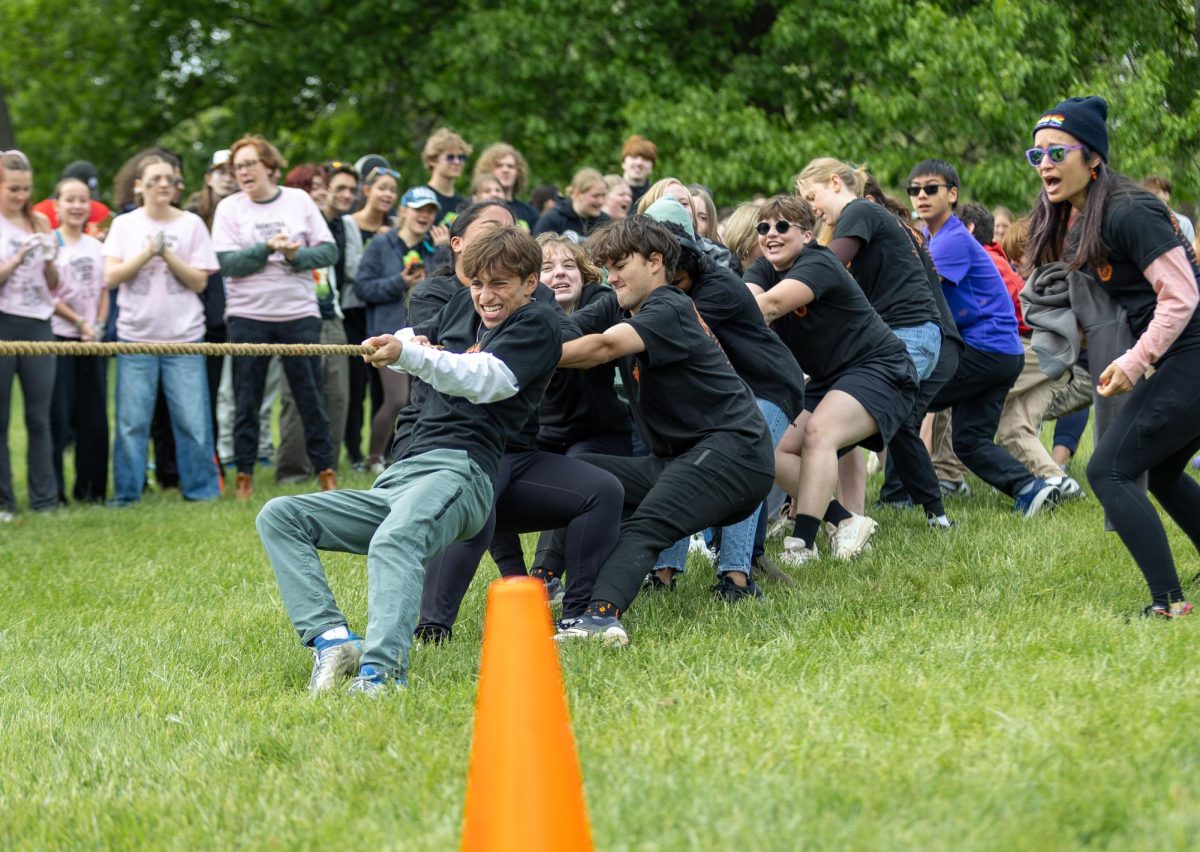Every Tuesday and Thursday from 3:00 to 5:00 p.m., in a small room attached to the University of Michigan Hospital, a group of ten adults attend a high school level class. Ranging in age from 32 to 60, each adult is taking the class for a different reason. Some are working to get their GED, some are working to improve their English, and some are there simply to improve their study skills. “Everybody in here has a different goal,” said Cheryl Pieszchala, who teaches the class.
“The first GED class was started in 2003 to help employees in the Operations and Support Services division complete the requirements to get their high school diploma,” said one of the creators, Steve Raymond. “The study skills component was added a few years later.”
Raymond is the Director for Leadership and Staff Development at the hospital, and along with the help of the Director of Ann Arbor Public Schools Adult Education, the class was created. The class covers math, science, reading, writing, and social studies. “Classes are now open to any [U of M Health Service] employee,” said Raymond. “The original program now consists of several adult education classes, including classes in English as a Second Language (ESL), and several other classes to help employees gain new skills and knowledge that will prepare them for career advancement with the UMHS or elsewhere.”
The class begins with vocabulary and etymology. Their vocabulary list includes words like multitude, sullen, transitory, vigilant, and zealous. Each word is pronounced, the definition is given, and then it is used in a sentence. After that, the students are allowed to work individually on the vocabulary as well as their own academic goals.

Barnessa Parker, a 56-year-old housekeeper at the U of M Hospital, is taking the class to receive her GED. “My oldest daughter [has] four grand-kids and three of them graduated [from high school] and I’m trying to get the fourth one to graduate.” Parker challenged her granddaughter, “I said, ‘If I go back and get my GED, you’ll finish school and get your diploma.’ So that’s our bet.”
Parker was her granddaughter’s age when she dropped out of high school forty years ago. She went to school in Ypsilanti, Michigan up until the eighth grade. Her family then moved to Flint, where Parker was to finish her high school education. Instead, things turned out differently. By the time she was 16, she had dropped out of high school and was married to a man 20 years older. “I regret in a way that I didn’t finish high school, but I had an interesting life at 16. By the time I was 20, I had four kids,” said Parker.
Parker says that her family’s move to Flint is the reason why she didn’t finish high school. “I know I would of finished if I had stayed here [in Ypsilanti]… I went to church, I went to school, I played in the yard. I was a kid growing up. When you came home from school you did your homework, I would sit down and do my homework with my grandma. I don’t know how but she must of got an education somewhere, we would play different games, she made school interesting. But Flint was a totally different environment,” said Parker.
For most of the students, taking the class is just as much about gaining confidence as it is about learning the material. For Pansy Mizell, who has taken some college courses, math was always her most difficult subject. “I was going to school and when it came to math I kind of froze up. I stopped going to [college] because the math scared me to death,” said Mizell. However, after taking this class Mizell feels that she will be able to go back to college and this time, succeed. “This class has helped me. It’s helped me quite a bit. I think that it’s going to help me get in there – it’s given me more confidence, more than almost anything, it’s given me a lot of confidence.” said Mizell.
Along with confidence, the class has given determination. Shawndell Wilson has been in the class for four years studying to receive her GED. The first year that Wilson took the class she did very well, passing her first four subject tests in reading, writing, social studies, and science. As the fourth and final test approached, Wilson’s grandmother suffered from a stroke and had to undergo a triple bypass surgery. “I really wasn’t focused on math. I was focused more on my grandmother,” said Wilson.
The next year she returned, hopeful that this would be her year to pass that final math test, but tragedy struck again; Wilson was in a horrible car accident and doctors didn’t expect her to live. Despite the odds, Wilson recovered, but she had lost chunks of her memory. “I forgot basically a lot of things concerning math … I couldn’t remember 4×4, 8×5,” said Wilson of her recovery after the accident. “I had flashcards where my kids were trying to teach me the math. It [has] been a slow process remembering. I have lots of papers at home where I know it’s my handwriting but didn’t remember [writing it].”
Just this past August, Wilson suffered yet another blow. “Last year … my dad passed away of cancer so again I wasn’t focused on [math],” said Wilson, adding ‘It seems like every time I take this class something tragic happens.” Yet disaster hasn’t broken Shawndell’s spirit. “Don’t give up on things that you want. Try to strive for better … I still come, I’m still here.”

Obeth Martinez-Vasquez, at 32-years-old, is the youngest student in the class. He is currently working as a custodian at the University of Michigan with four years of college under his belt. However, he took his college courses in Mexico and needs to improve his English in order to get a nursing job in the states. “I would like to become a nurse or maybe an assistant. So in order to do that I need to pass a compass test at Washtenaw [Community College] and then transfer to Eastern or [the University of Michigan],” said Martinez-Vasquez. Though he is strong in every other subject, he knows that it is crucial to be strong in English as well. This class is helping him to improve his grammar and speaking. “[This class is] important because if I want to have a better job I need to do the English, that’s the only part. To have a better job and be successful I need to do that.”
Though every student in the class has their own reason for taking the class, one thing they all have in common is a determination to meet their goals despite any obstacles they may have faced. The class is filled with spirited and unique individuals with a passion for learning and bettering themselves. They are a prime example of what can be accomplished with hard work, determination, and a smile.
Listen to Shawndell Wilson speak about her story here:









